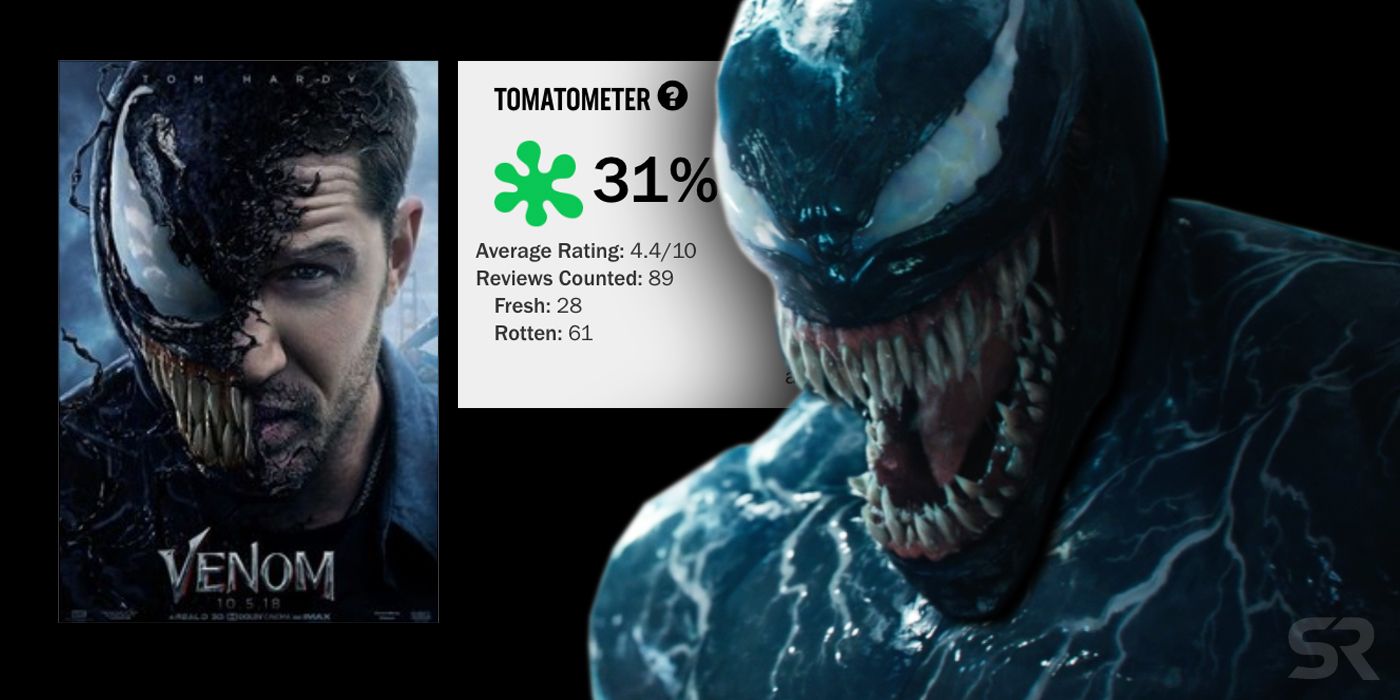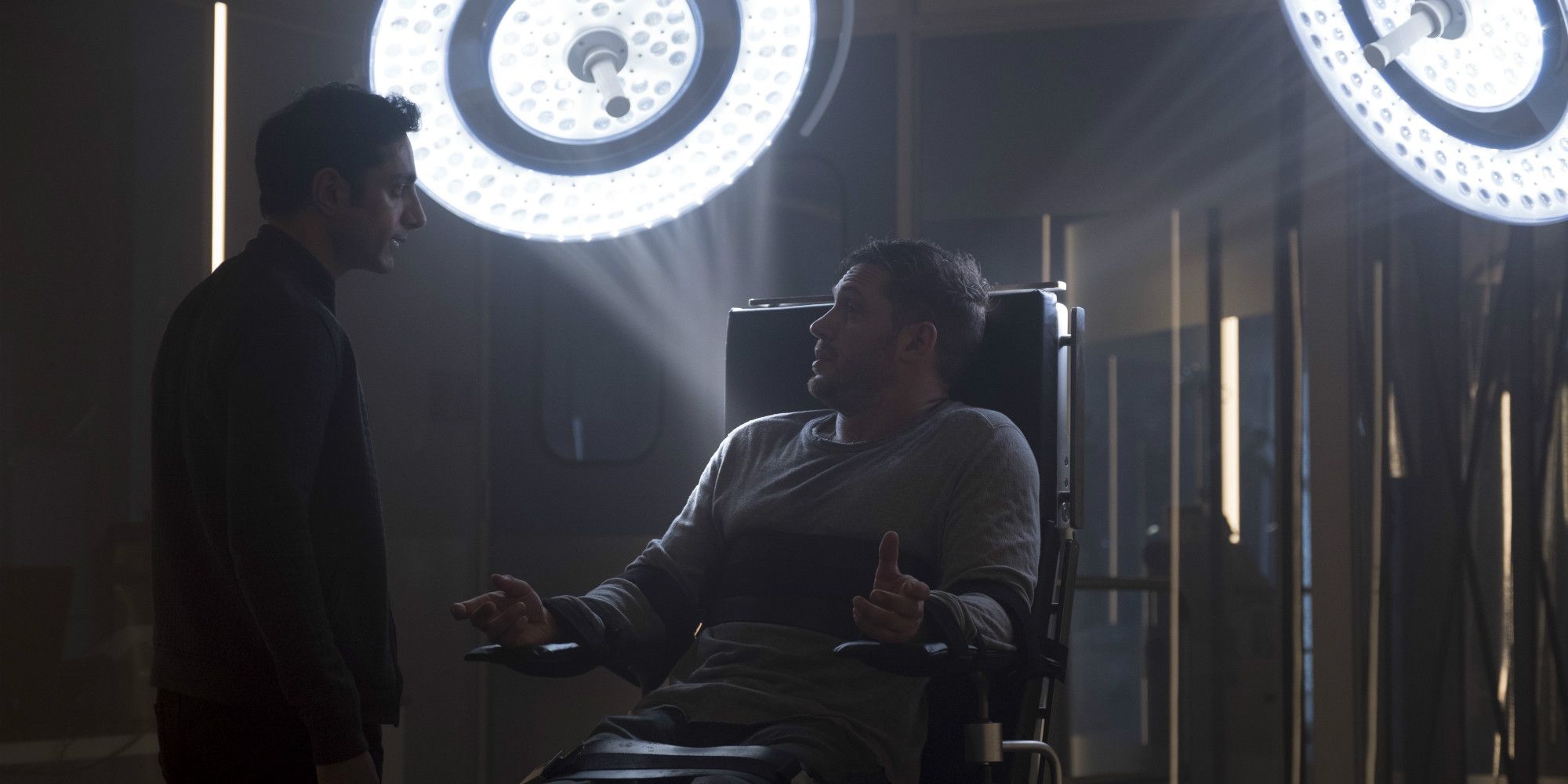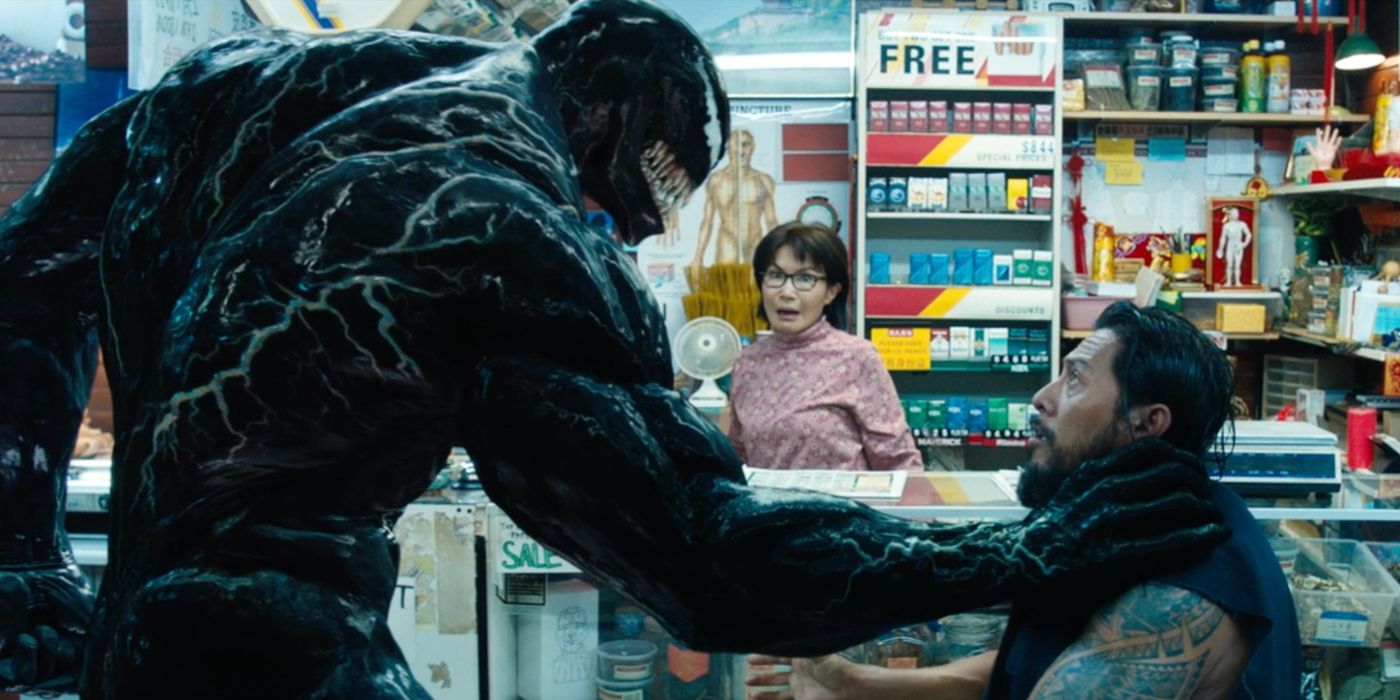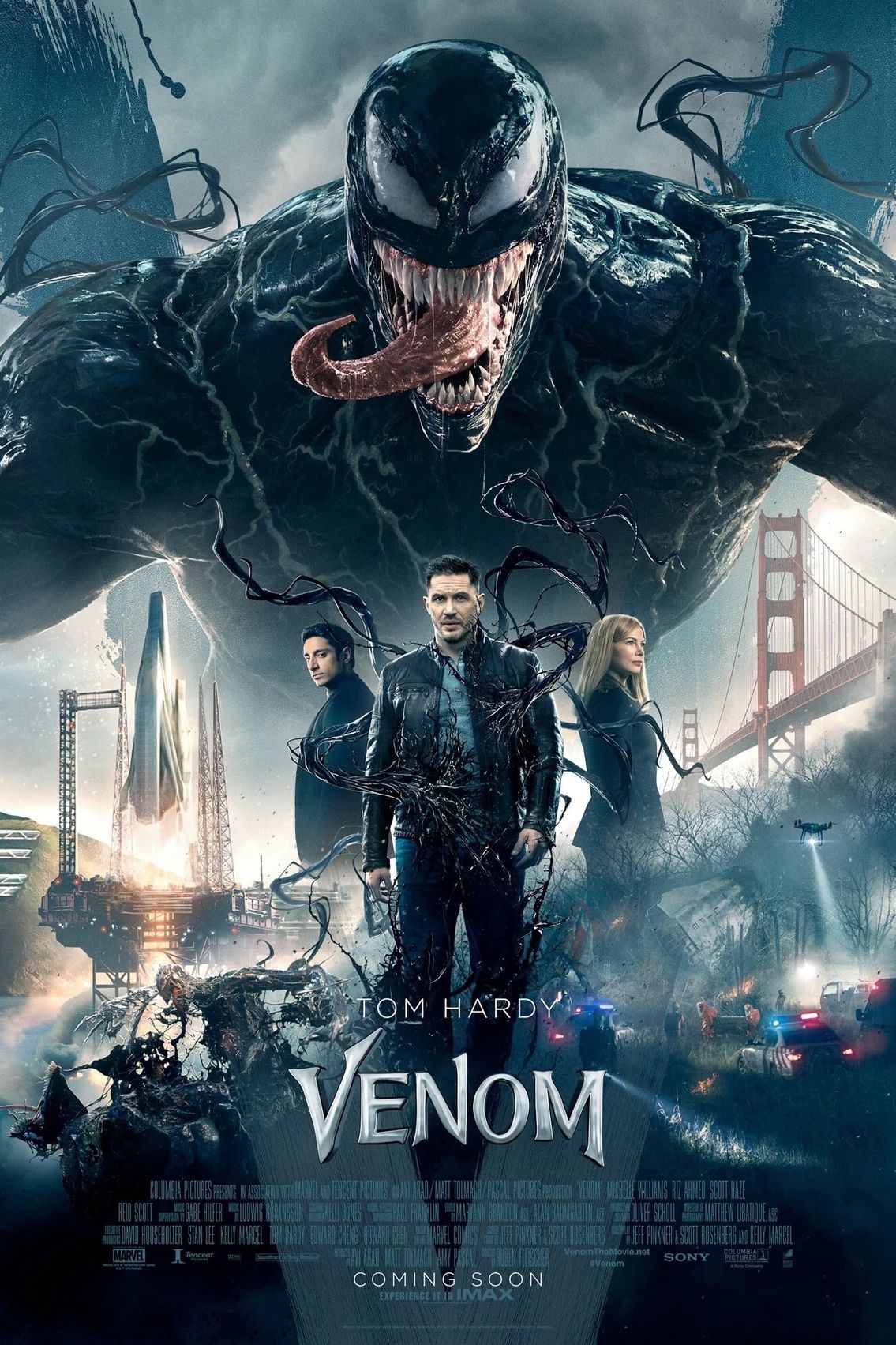Venom's reviews completely misunderstood Venom. The prospect of a movie starring the alien symbiote made famous for attaching itself to Spider-Man has been there since the late 1990s when Sony acquired the Spider-Man movie rights, and after many false starts - including a spinoff of The Amazing Spider-Man - it's finally here. Tom Hardy is Eddie Brock in Reuben Fleischer's Venom movie, which tells a new, Spider-Man-less origin and looks to set up a whole new shared universe of Spidey villains (and possibly link to the MCU).
If you were to go entirely by the reviews, you'd be forgiven for thinking that Venom was not worth all that waiting on behalf fans and the efforts of those involved. The early reactions compared it to early-2000s efforts like Catwoman and Daredevil along with more-recent all-out failures Green Lantern and Fantastic Four, and the full reviews weren't much kinder. The film has a stinging 30% on Rotten Tomatoes (21% amongst Top Critics) and 35 on Metacritic. While both metrics have their issues, those numbers unavoidably show that the approval for Venom amongst critics was not good.
Related: The Most Brutal Reviews Of Venom
However, digging deeper, that appears to be only one side of the story. As we'll see later, general audiences have responded much more positively, and there appears to be a general misunderstanding in those reviews of what Venom is trying to be and how it wants to be viewed. Here's what was missed.
- This Page: What Venom's Reviews Got Wrong
- Page 2: Venom's Reviews Are Part Of A Bigger Problem
Venom Is Not The Character Most People Think
A lot of opinions regarding Venom center on the bigger picture aspects from its development, mainly the absence of Spider-Man and conversely its attempts to kickstart a new universe apart from the MCU. And while those are definitely topics of discussion, neither is a primary concern in Venom the movie - nor should they be.
Venom is, of course, a Spider-Man villain. Not just that, he's the Spider-Man villain with an origin most linked to Spidey: the symbiote came to Earth as Spider-Man's Secret Wars suit, later trying to corrupt Peter Parker, and became the Venom everybody purports to know when it attached to Peter's professional rival, Eddie Brock. This is the Venom villain story that's been retold across media, from the 1990s cartoon to Spider-Man 3. The problem here is that it all happened in the 1980s; there are three decades worth of Venom stories since that run in The Amazing Spider-Man, and a lot has changed.
That original rivalry ended when Spider-Man saved Anne Weying, forming a deal with Brock and the symbiote: Venom wouldn't kill Spidey as long as Spidey didn't chase him. Venom's solo comic (the Lethal Protector arc on which the movie is loosely based) picked up with Eddie Brock in San Francisco where he was trying to work with Venom to protect innocents, eventually seeing him form a shaky bond with Spider-Man and almost give his life to save an underground city of homeless people. From that point, Venom was firmly in anti-hero territory, fighting with his own morals. His popularity in the 1990s saw him come up against other symbiotes and generally become a major Marvel player in his own right - independent of Spider-Man. Recently, his mythology was vastly deepened by becoming part of the Guardians of the Galaxy.
Read More: Venom Erases Spider-Man To Avoid Marvel Mistakes
Plainly, Venom without Spider-Man or Venom as a line-toeing anti-hero doesn't betray what's in the comics; rather they honor pretty much everything after the overdone story everybody knows. This semi-assumed familiarity with only the very early days leads to a skewed view of the character and subsequent assessment of what he is: that would be like saying Iron Man isn't faithful because it has no Cold War paranoia.
Venom's Reviews Think They're Laughing At Venom (Not With It)
Even if there was a unified view of Venom, that likely wouldn't have done much to get around the fact that many were expecting the movie to fail: from spending most of pre-production as a "they're actually making this?" prospect to weak trailers, Sony never gave cause for much faith. That is, of course, not the reviews - it's the lead-in - but expectations for what Venom was trying to be are incredibly important in the assessment of what is, ultimately, a very weird film.
Tom Hardy goes for broke in Venom, eating cold chicken out of a bin, cooling off in a lobster tank and making out with the symbiote. He's an actor known for his bold acting choices, and Venom has all the makings of a greatest hits. This, along with some other jump-out comedic moments has elicited screens full of laughter. The issue here is that in many of these cases, it feels like it's been taken as laughing at Venom, not with it. All of this (or at least, most of it) is intentionally off-the-wall and humorous. Let's not forget the director is Ruben Fleisher, whose directorial debut's best moment was the sudden death of Bill Murray. It's meant to be crazy and weird. If it brings out a laugh, then it's winning.
Related: Venom Does One Comic Thing So Much Better Than The MCU
This reading of the film seems to correlate almost directly with enjoyment, and the reviews suggest the converse is true. That isn't to say that Venom being knowingly weird makes it a great film. There are still tonal issues within the comedy and its pacing throughout every scene is frantic, and those aspects deservedly invite the comparisons to early 2000s movies. However, the implication that the lobster scene is unintentionally on the same level as Halle Berry pretending to be a cat is a step too far.
Between the premise and the approach, it feels like much of the Venom backlash comes from treating the movie as something it fundamentally isn't. It's a bad serious film in the same way it's a bad cosmic adventure: it isn't trying to be one.
Page 2 of 2: Venom's Reviews Are Part Of A Bigger Problem
Will Venom's Fortunes Turn?
The discussion with Venom now becomes whether it will get a somewhat-deserving reappraisal. Can it overcome the initial backlash to become regarded as an average but fun ride, something approaching a cult classic? That question's being asked a lot, although misses something key: the general mood is already rather positive.
Cult classics are typically films that emerged as beloved (earnestly or ironically) over time. Venom was a box office smash, easily beating out second place hit A Star is Born (at one point tipped to nab #1) on opening weekend and stronger projected legs than a film of its reviews usually suggest. Indeed, the audience response is certainly more positive. The 89% audience score on Rotten Tomatoes is even harder to take seriously than the critical reviews thanks to bias and the possibility of bots, but it nevertheless attests to an up-swell (the CinemaScore B+ attests to this). As it stands, Venom seems like a rather popular movie; it can feel like takes it isn't as bad as people say outnumber those claiming that it's actually bad.
Related: All The Spider-Villain Movies Coming After Venom
What we have is an early misunderstanding of Venom, one that will be with it forever thanks to the magic of RottenTomatoes, but even one week on doesn't feel fully representative. The negative reviews will remain forever, yet its entertainment value doesn't look to have be too overshadowed by them.
Venom Shows We've Forgotten What An "Average Movie" is
All of this discussion does somewhat elevate Venom to a level it needn't be. At the end of the day, what Sony's released is a totally average film, one that offers some good elements, some bad, and is packaged for mass consumption. It's not a grand exploration of arthouse themes trussed up as action spectacle, but neither is it a waylaid project hacked by edits and cobbled together with reshoots (the pacing is fast, but everything's there). And it seems that we've forgotten how to deal with a plainly average movie.
Studio tentpoles have, on the whole, improved in recent years, with a stronger effort to make something actively good (or widely pleasing). This is obviously for everybody's benefit but means that when we're confronted with something that isn't as high-minded as Blade Runner 2049 or technically masterful as Mission: Impossible - Fallout, the quality gulf feels grander. You can see this in Venom, but it's also there with the likes of Tomb Raider, a film that presented interesting and inventive ideas for the character with a strong sense of identity linked to the rebooted games that was given a harder time based on it also having some key flaws as well. By today's standards, if a movie has bad aspects, then it is bad. It's an internet-induced binary, and it does nothing good for actual film criticism.
This goes double for superhero films. Marvel's dominance of the zeitgeist is unquestionable, and a lot of that has come down to them consistently releasing entertaining movies. But the flipside is that their formula has begun to shape what a "fun" time at the cinema is: lots of laughs, bright action, fuzzy feeling at the end (Avengers: Infinity War notwithstanding). This makes for crowdpleasers but has the side-effect of devaluing the definition of entertainment - when "fun" is the ultimate goal, more challenging aspects can be forgotten (or disliked). To whit, Ant-Man & the Wasp is a considerably less inventive film than Venom with a much more basic approach, yet its reviews skewed positive thanks to the welcoming tone. Two average movies, two very different perceptions.
Read More: It's Not Enough For The Marvel Cinematic Universe To Be "Fun"
-
None of this is intended to provoke any "fan-critic divide", a phenomenon that has exploded in recent years, but to say that the first takes on a movie shouldn't be the be-all-and-end-all. Venom is as imperfect as its parasitic protagonist, and there's nothing wrong with that.






